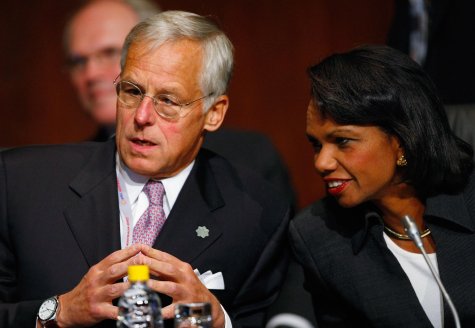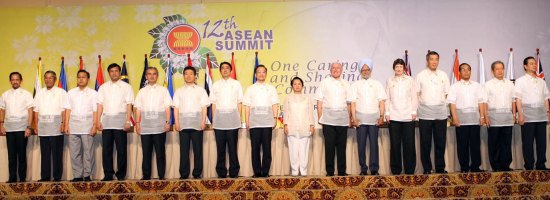- Two weeks ago, a small town on the outskirts of Phoenix in Arizona held a local government election. They counted exactly equal votes for the candidates — so in equal parts publicity stunt and tie-breaking process, the two guys involved drew high cards. Courtesy of an obscure and not even that old Arizona law, the decision is totally legit!
- Something else I missed last week: on Monday, a company called CLEAR that ran separate security lanes at most big American airports shut down abruptly. Their service always struck me as questionable — pay us money and we’ll overlook normal security measures! — and they never did get all the official approvals they needed, so I’m amused that the recession has killed their little scam. (Heck, second-tier frequent flyers get much the same benefit; maybe that’s why I’ve never seen anyone use a “Fly CLEAR” lane.)
- According to my local papers, an equal (or bigger!) issue than the California budget is the proposal to build a high-speed railway to LA (which won financial backing at referendum last November). It’s a curious thing to watch Bay Area residents whine about whether to spend billions on above-ground tracks or billions more below ground, while around them the state runs out of cash. (Admittedly, the project has a good chance of getting federal money, and the planning phase has at least a year left in it, nevermind the ten-ish years scheduled to build the thing.)
Randomly: card games, airport security, trains!
Plodding onwards with APEC
It’s really very annoying that reports about APEC in the local media are primarily focussing on John Howard, George Bush, and (to a lesser extent) Hu Jintao. Do our journalists need reminding that Sydney is also hosting the prime ministers of Japan and Canada, the presidents of South Korea and the Philippines, the chief executive of Hong Kong, and many more?
With the main leaders’ summit not happening until tomorrow, it’s too early for me to make any sweeping comments, nor will I not jump on board with critics of the cost (running any kind of conference is expensive!). And while the police panic about a few protesters is way over the top (WA police didn’t need to invent new crimes for Hu Jintao’s visit!), it’s also the case that APEC has the heaviest security requirements of just about any major international meeting.
But the meat in the sandwich, if you will, of APEC gatherings has always been the meetings held informally on the side. And so far they’ve been far from stellar: a treaty giving Australia access to American military technology, slightly more funding for APEC’s secretariat, a new security meeting between Australia and China, mutterings about missile defence, and rehashes of supposed commitments to the Doha negotiations.
Really, the most impressive announcement has been the arrest of the Chaser boys.
ARF 2007: who will go to Darfur?
Last week’s series of ASEAN meetings, including the ASEAN Regional Forum (at which North Korean nuclear weapons were the hot topic, though the Western media hardly noticed), were a continuation of the process started some years ago of taking definite-but-not-hasty steps towards further integration and formalisation in the region, this being typical ASEAN style. As examples, the meetings produced a tentative human rights agreement and a new ARF adjunct group.
But most interesting has been that one of the key topics for discussion (on the sidelines of the meetings, at least) was Security Council resolution 1769, which authorises a peacekeeping force in Darfur. It seems that a few participants — particularly John Negroponte, who attended for the US in Condi Rice’s absence — were asking around to see who’d be willing to send some troops. So this year is notable as an occasion where ASEAN meetings have had an impact beyond the immediate region.
On our behalf, Alexander Downer announced that the Australian military is too busy to pitch in for Darfur (and although he was criticised, if you believe that we absolutely need to be in Iraq, I suppose that’s kinda reasonable). He also signed a new partnership agreement that will hopefully strengthen Southeast Asian ties, in a gradual and very ASEAN kind of way.
EAS, round 2: energy deals grab broader attention
(Admittedly, this post is several days late; I blame family.)
So the East Asia Summit for 2006 (er, 2007? 06-07? or something?) has drawn to a close, and although the institution is still new and finding its feet, this year has presented a few good signs that the Summit will have a successful future in encouraging regional cooperation.
Aside from several measures to promote regional trade, the big announcement was a declaration that promises cooperation on “energy security”, which is to say there’ll be a big push for investment in transmission and generation infrastructure. Assuming the declaration is followed through, there’ll also be a few token measures towards bio-fuels and renewable energy (though admittedly that’s better than nothing).
I think it’s illustrative that our local daily gave a big chunk of space on the business pages to an AP story about the energy pact, which seems to mirror several other news services I’ve checked. In other words, talk of energy deals makes business leaders (or at least business press editors) stand up and take notice — which, if nothing else, has the benefit of giving the Summit some more widespread attention than it’d otherwise earn. On that front, the EAS has already done better than APEC meetings of recent years, none of which have produced anything quite as noteworthy.
Within that context, the Japanese government has already stepped forward with a donation of US$2b for energy research, yet another component in its long-term programme of being the region’s aid financier. Similarly, the AusAID announcement earlier in the week of $5m to combat bird flu was soundly trounced by a Japanese pledge of an additional US$67m. These donations are important in the sense that they’re giving substance to the decisions being made at the EAS — which suggests that to some extent, the EAS is already getting things done. (On the other hand, though, Japan was donating money for disease prevention long before 2005.)
Speaking of Japan, simmering resentment between it and China earned barely a mention in most media coverage of the second Summit — unlike last time — and this is pretty much entirely due to Shinzo Abe taking over from Junichiro Koizumi as PM. Abe has made little in the way of significant changes to Japan’s dealings with China, but simply by not visiting the Yasukuni Shrine (as PM) he has defused tensions enough that an entire section of my thesis is rendered obsolete. But that’s a good thing, because I argued that a rift between the region’s largest economies was the single biggest issue in the way of a successful EAS.
Interestingly, Russia wasn’t at the table this time around, even though its presence would have actually been relevant on the question of oil supply (so I suppose that ends the speculation from 2005 about whether it’d become a fully-fledged member!).
The broader ASEAN Summit (of which the EAS was one part) earned headlines for a declaration about terrorism and progress towards an ASEAN Charter, but otherwise there was little reaction to the events of the last 12 months. It is the ASEAN Way to not criticise any country’s domestic affairs in public, so there was nary a whimper about the fact that Thailand was represented by a military general. North Korea and Myanmar were both told off, the former about the 6-party talks and the latter for lacking democracy, but these announcements have become yearly stalwarts. Beyond that, the only announcement that struck me as interesting was the plan for new university courses as part of the cultural component of the forthcoming ASEAN Community.
As a final note, the most prominent mention that the Summit got in Australia was John Howard’s stopover in Broome on the way back. Frankly, were I in his shoes, I’d probably do the same — although I’d have covered my back for the inevitable “who paid for this?” squabbles ![]()
Stressed? Me? Never!
So I have just managed to survive a rather stressful day at work today. That said, it was also somewhat amusing and entertaining, so it wasn’t all bad. I randomly ran into Boshra, which was cool (if I didn’t know better, I’d swear she was stalking me …). And it was very amusing to hear my manager describe one of the guys organising an upcoming conference when the latter called to ask, “hey, we need you guys to create 25 generic accounts for us, in the next ten minutes please, if not sooner”. I think that was a case of what HR-buzzword types call a lack of direct and effective communication.
On the topic of my job, let me just say that the Ascent 2000 Building Automation System, which is the i386 program running on QNX that controls every electronic lock on the UWA campus, is quite seriously teh suck. You’d think, being as it is a computer system, that if I said “here’s a bunch of students that have access to Door In This Building, and I now need them to have access to Door In Other Building” that you could just copy across the list of students, set the door you want, and be done with it. But no, the Ascent 2000 system is way too cool to allow something like that. Instead, you have to print out the first list of students (on a form-feed printer, no less), then tick off the ones that already have access, then MANUALLY TYPE THE CARD NUMBERS IN ONE BY ONE. And guess who got that job?
Meh. To conclude, I might continue with what I’ve just decided to be a trend for random state political commentary. I was watching Stateline tonight, as one does when one is sitting in front of a TV on Friday with insufficient energy to think, and there was a debate between our esteemed Health Minister and his Opposition counterpart. Now Jim McGinty is a pretty cool guy — I got to shake his hand not once but three times (IIRC?) way back at my high school graduation. He was, however, totally outclassed by this Liberal guy. Poor Jim looked like he was hiding behind a barrage of statistics (hang on, he has the health portfolio … of course he was), while Dan Sullivan looked lucid and on top of things. Intriguing, particularly since (as the presenter pointed out lots of times) the Gallop government did get in largely on the promise of Fixing The Health System ™.





 Atom feed
Atom feed

